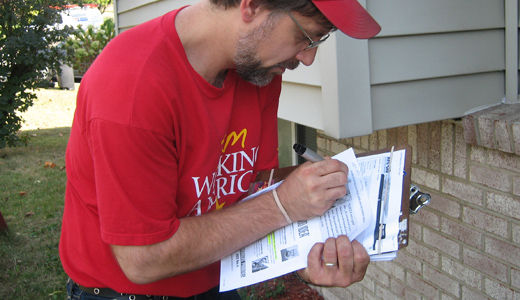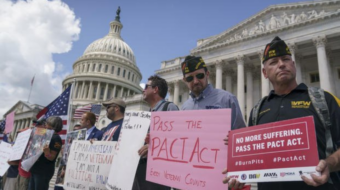
WASHINGTON – Speaking to top leaders of European trade union federations gathered at the national headquarters of the AFL-CIO yesterday, Damon Silvers, the federation’s policy director, said the economic instability driving workers to “support right wing authoritarians like Donald Trump” stems directly from the failure of the “world wide market-based utopia” promised by “neo liberals.” He used the term to describe leaders such as Bill Clinton in the U.S. and Tony Blair in the U.K.
From now on, Silvers said “we must insist that candidates we support are committed to full employment and economic security for all.”
Silvers was speaking at a forum on countering the global rise of right wing populism. Participants included the heads of the European Trade Union Confederation and the International Trade Union Confederation. Also participating were representatives from labor federations in the United Kingdom, Belgium, Germany, Bulgaria, and Sweden. The gathering was sponsored by Working America, an AFL-CIO affiliate, and by the Friedrich Ebert Foundation of Germany.
All the speakers stressed that to defeat the right wing, unions must develop alternatives that truly address the problems workers are facing and must involve the workers themselves in face-to-face discussions.
The battle against the right wing, Silvers said, “won’t be won on television or on the Internet. It will be won through organizing working people, face to face.”
In developing political alternatives to the right wing, Silvers said, unions “cannot compromise with candidates. Reaching out to Wall Street and to neo-liberals reinforces the perception that [politicians we support] don’t care [about workers].
“The candidates we support,” he said, “must fight for public investment in re-building our infrastructure and in education. They must be committed to the right of working people to organize and to bargain collectively.
“They must be committed to the idea that democracy must be wed to economic justice.
“There can be no triangulation, no third way,” Silvers concluded.
“Third way” and “triangulation” were terms used in the U.S. by Democratic Party political leaders who stressed “building bridges to” and “making common cause” with non-progressive policy makers.
At the forum, Luca Visentini, general secretary of the European Trade Union Confederation, explained that the conditions nurturing the rise of Trumpism in the U.S. are also creating a fertile field for the growth of xenophobic nationalism in Europe.
He explained that after World War II the right wing developed a moderate, conservative face. But in the 1990s, a new political force came into power: neo-liberals who promised that if “obstacles to a free market were removed,” a “utopian global economy” would grow. The role of government could be reduced because the market would create prosperity and lessen the need for social safety nets.
With this, the right wing was free to revert back to its old goals. Under the guise of helping to create unfettered free markets, the far right successfully worked to undermine unions and to slash many social welfare programs.
The result was that when the economies of European countries went bust, especially after the 2008 economic meltdown, workers who had lost their social welfare benefits and protections were left out in the cold.
Many European countries adopted “austerity” programs, Visentini said, but these only made matters worse.
In the U.S., the government bailed out the banks and financial institutions that created the crash in the first place, but workers’ standard of living plummeted. Many lost their jobs and most lost job security.
The lack of an effective program to protect workers from the fallout of 2008 has paved the way for the authoritarian right wing.
Both Silvers and Visentini pointed out that although they use the language of populism, leaders like Trump are anti-union and anti-human rights. They encourage and feed on the racism and xenophobia that are often by-products of economic fears.
Workers would be less afraid if they had a strong union movement.
Both said that unions must mount campaigns to convince European and American working people that newly-arrived immigrants and refugee are workers, too, and that they could help to rebuild the union movement.
“But we must not shame [American and European] working people,” Visentini said, “we must include them in decision-making and rebuild their feeling of being involved in the movement.”
A recent study conducted by Working America among Trump supporters concluded that “thoughtful conversations with trusted messengers can move voters away from right wing populism to a different take on issues.”
In his talk, Damon Silvers said “We must change the narrative and change the reality on the ground.”
Photo: Working America Voter ID and Persuasion: Working America Field Manager Dave Ninehouser, door to door volunteer in Pennsylvania. By Molly Theobald for the aflcio2008 – PA:, CC BY 2.0.










